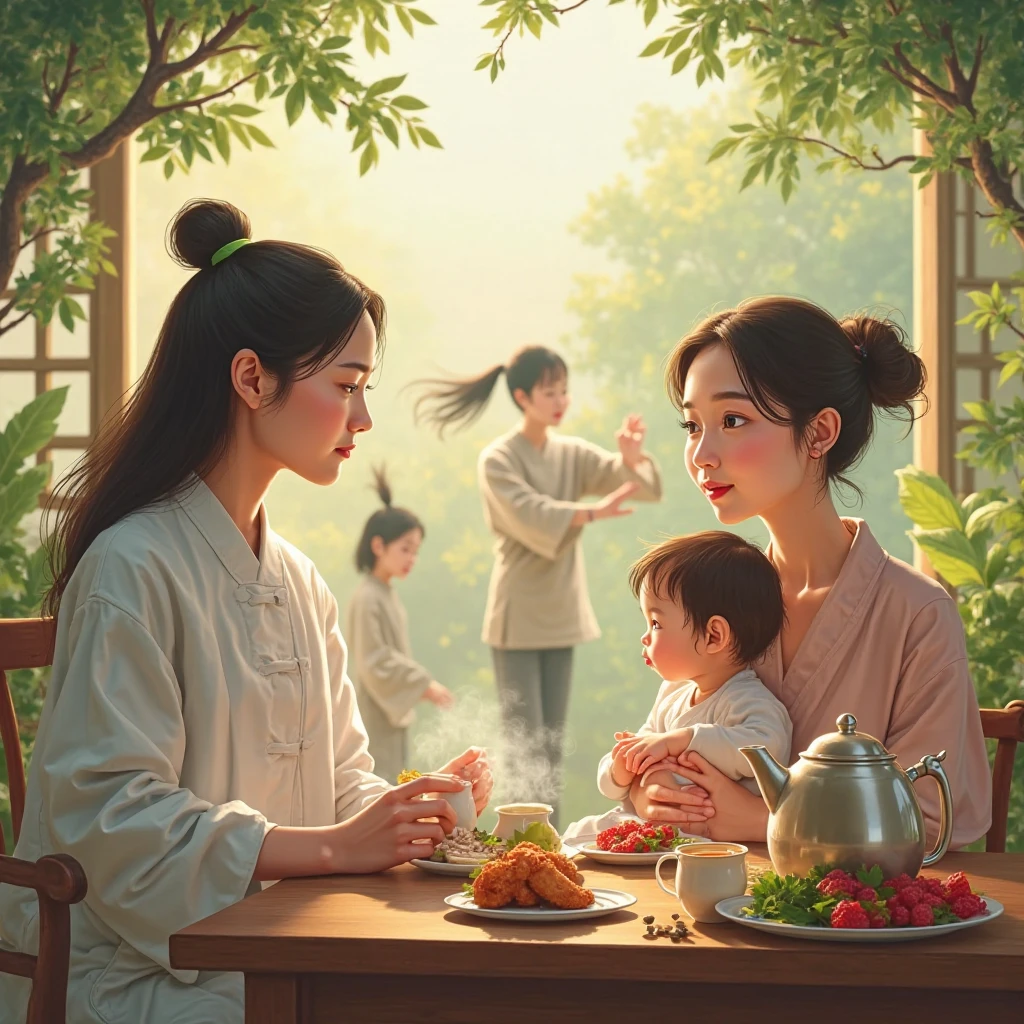一、疾病为何“病去如抽丝”?从中医角度看本质
俗话说“病来如山倒,病去如抽丝”,不仅是一个比喻,更是中医对疾病规律的深刻总结。疾病的往往是长期不良习惯积累的结果,比如熬夜肾伤、饮食无度伤脾、受凉耗阳气。这些问题日累月累,逐渐让身体从“亚健康”滑向“疾病”。因此,恢复健康也需要这段时间,指望一两药或不能几天调整就彻底好转。
一位30岁白领,长期熬夜加班,爱吃烧烤和奶茶,最近半年反复牙痛和胃胀。检查发现脾胃湿热、肾阴亏虚。中医调理3个月后,牙痛消失,胃口变好,但若恢复熬夜习惯,症状又会反复。这说明,生活习惯不改,疾病根源难除。
建议延伸:
- 观察自我法:每天记录身体变化(如疲倦、口干、大便状态),找出与生活的关联。
- 循序渐进调整:每周改掉一个小习惯(如减少一次夜宵),逐步改善体质。
二、饮食建议:因人而异,吃出健康
饮食是健康的基石,但不同体质的人需要不同的调整。
- 体质与饮食搭配:
- 湿热体质(口苦、易上火、大便粘):少吃油腻、辛辣,多吃绿豆、薏米、冬瓜。
- 脾虚体质(大便不成型、疲乏):避免生冷水果,多吃山药、红枣煮粥。
- 阴虚体质(口干、失眠):少吃炒货,多喝枸杞菊花茶。
- 现代饮食陷阱:外卖高油高盐、速食食品添加剂多,长期食用易导致湿热内生。建议每周至少3天自己做饭,用蒸煮代替煎炸。
- 儿童饮食误区:很多家长觉得孩子爱吃就给吃,却不知道巧克力、薯片易积食,导致反复感冒发烧。建议用苹果泥、山楂水代替零食,既开胃又助消化。
- 【饮食建议】
平素除开要少吃肥甘厚腻的难消化的食物。还要注意:要吃主食(如:米麦面),不要吃糯米及代餐的东西。
不要过多吃肉,小菜每天都要吃些。 - 1)肉类:
尽量食猪肉(猪脑壳肉也不宜吃,大寒之物)、鸭肉、少量的鸡肉(偏热)。
其他如牛羊肉,海鲜,河鲜,驴肉,蛇肉,狗肉,动物内脏,虾子腊肉等要少吃。
总之肉类大多数都可以算是发物,并且现在的动物都是集体养殖,喂激素,抗生素催熟的,因为生存环境很差,不得不喂药来减少生病。
有个纪录片,值得了解,叫《统治》。
BBC纪录片《统治》
里面有这样一个镜头,由于大量饲料投喂,肉鸡长得过快,以至于双腿无法承受住自身的体重。 
当你发现你吃的鸡腿,羊腿,骨头很细,肉很多的这种,往往就是这样养殖出来的。
动物都是在生病之前被宰杀的。所以最后这些各类指标超标的肉被人吃到胃里。- 2)小菜类:
春季野菜,笋子,橛子,藠头避免吃。其他不属于大发的食物可以吃。 - 3)水果类:
大多数爱吃水果的人都是因为有内热,所以吃点凉的才更舒服,但水果并不能清掉内热,而是耗损阳气,多吃则败胃阳,造成体内寒热夹杂,脾胃阳虚的人多见大便不成型,一年四季手脚冰凉,吃多而瘦或吃少而胖的人,这些人都要注意少吃水果。 - 4)坚果类:
有部分同样是发物,如松子,蚕豆之类。
推荐核桃,敛气又固肾。
阴虚的人要少吃炒货,炒瓜子,炒花生之类,吃的多口干更严重。 - 5)零食类:
辣条,奶茶,冰棒,饮料这些尤其要避免吃,不论是哪种体质的人多吃都是伤脾胃的。辣条耗损胃阴,奶茶易生痰湿。 - 6)其他
以上所列根据个人病症和体质各有侧重,比如痰湿重的人,不宜多吃水里游的,包括乌龟甲鱼无鳞鱼;
阴虚风动的人,宜少吃鸡爪、鸡翅、泥鳅、鳝鱼、海鲜、毛尖绿茶等等;
肝胆,肠胃不好的人不要喝酒,白酒伤肝胆、啤酒伤脾胃,长久喝酒的人必总是腹泻;
易上火的人体内热重,火锅、烧烤、煎炸、烘焙类都要注意避免吃;
血压高者可以晚餐减量,不饿可以不吃晚饭,但不要用水果零食来代替;
容易皮肤过敏的人,尽量不要碰芒果、虾子;
湿重的人,少吃豆子。
三、穿衣建议:防寒保暖的科学与细节
很多人不知道受凉的标准,往往受凉都是在不知不觉中开始的,受凉后的症状也并不单单是打喷嚏流鼻涕,而是可能加重基础病。
因为新冠之后人们的体质普遍下降,很多时候寒邪不会停留在体表,而是直入深层埋伏,有的人感觉最近睡眠变差,或者鼻炎加重,甚至月经不调,最后发现都是跟寒邪有关。
包括很多时候服药期间本来越来越好,突然又有反复,也是跟受凉有关。
受凉是疾病的常见诱因,尤其是在季节交替时。以下是更具体的指导:
- 穿衣分层法:内层吸汗(如纯棉T恤)、中层保暖(如羊毛衫)、外层防风(如冲锋衣),方便调节。
- 重点部位防护:
- 颈椎:戴围巾防“富贵包”受寒,避免肩颈痛。
- 腹部:穿高腰裤或肚兜,保护脾胃阳气。
- 脚部:晚上泡脚后穿袜子,防寒从脚起。
- 儿童保暖技巧:孩子感冒快,易出汗,建议睡前垫隔汗巾,汗湿后及时更换,避免夜间受凉。
四、睡眠与同房建议:养精蓄锐的核心
晚上要按时休息,11点前能够入睡,如果因为入睡困难晚上习惯看手机,就先把习惯改过来,否则和药力对抗,不利于恢复。
睡眠和性生活的节制直接影响气血恢复:
- 优化睡眠质量:
- 睡前仪式:喝杯温牛奶或听10分钟禅乐(如《云水禅心》《中医养生疗愈音乐》等),放松身心。
- 环境调整:保持卧室通风,避免电子产品蓝光干扰。
- 儿童睡眠管理:孩子睡前避免兴奋游戏(如手机),可用讲故事代替,助其平静入睡。
- 同房节制原因:中医认为精气是生命之本,过度消耗会导致腰酸、乏力、免疫力下降。年轻人戒手淫后,常反馈精力更充沛。
年轻人有手淫不良习惯的,一定要改过来,断掉这种伤身恶习。
夫妇之间,凡体质不佳的人宜减少房事,不多于一月2次,较严重者宜禁房事半年以上。否则会迟不见效。 - 案例补充:一位25岁男性,因失眠手淫导致失眠和记忆力下降。戒除后配合早睡,2个月后精神状态明显改善。
五、运动建议:动静平衡,因人而异
1)忌不动
要适当坚持运动的习惯,忌长时间久坐,如打麻将,看电视,玩手机电脑。
2)忌乱动
气血偏虚者,不宜做剧烈运动,可以每天散散步,简单的伸展运动,太极、八段锦都可以。
阳气偏虚者尤其不宜游泳。
运动能促进气血流通,但过犹不及:
- 适合人群:
- 上班族:每天步行30分钟或做5分钟肩颈拉伸,缓解久坐疲劳。
- 动作:太极拳或八段锦,每次15分钟,增强体质不伤气。
- 儿童:户外跑跳半小时,促进发育,避免积食。
- 避免提醒:气血虚者(如头晕乏力)不宜跑步,阳虚者(如手脚冰凉)不宜游泳,佩戴外套虚寒。
案例补充:
一位50岁阿姨,阳虚体质却坚持游泳,结果手脚更冷。改为每日散步后,睡眠和胃口都有改善。
六、情绪建议:养心养性,远离疾病
情绪是健康的杀手,需要特别关注:
- 情绪管理技巧:
- 深呼吸法:生气时深5秒,慢吐气5秒,重复3次。
- 转移注意力:看《了凡四训》电影或听蔡礼旭讲座,平和内心。
- 儿童情绪引导:孩子发脾气时,家长先冷静,用拥抱代替责骂,逐步培养其情绪稳定性。
- 社群支持:加入我们的社群,与志同道合的人交流,缓解焦虑。
总结:健康从点滴做起
最近,我复盘了一遍2024年我看的所有患者和病种,统计下来发现,我看的儿科和妇科是最多的。
我发现现在小儿的体质真的普遍不好,尤其扁桃体肿大,腺样体肿大的特别多,另外比如不长个,不长肉,晚上睡觉大量出汗,睡眠不安稳的也普遍。
既然大家的问题有这么多相似之处。那么有没有共同的原因呢?
当然一定是有的。小儿大多数问题的根源来自两点:
1,先天不足:宝妈怀孕之前的身体体质就不怎么好,还有怀孕期间也没有注意养成健康的生活饮食习惯,最后影响到孩子的身体体质。
2,后天习惯:饮食,睡眠,情绪等等多方面缺乏正确的引导,举例:很多宝妈对于怎么样喂养孩子是没有认真研究的,总是认为孩子想吃什么就给TA买什么,殊不知消化不良的食物就是祸患啊。
先天不足,本可以后天调补。
我专门写的一篇《小儿医嘱》,我就已经详细交代了有利于健康的饮食等习惯。


发表回复